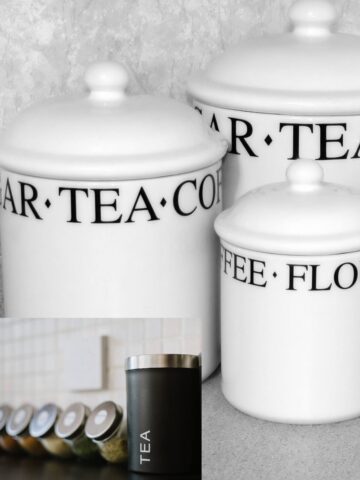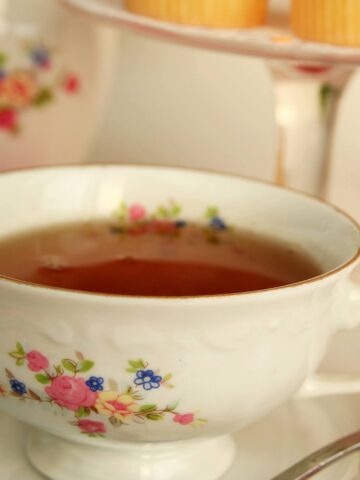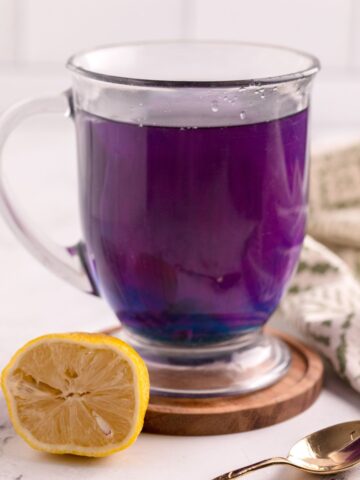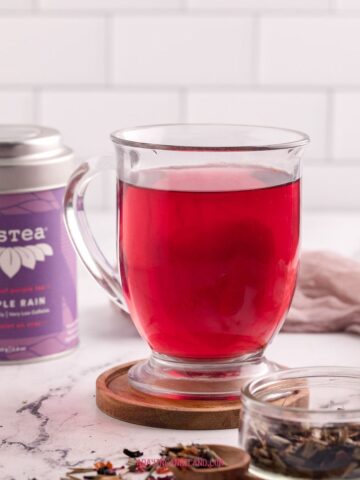If you want to lose weight and looking into intermittent fasting, start here to learn about the best teas for fasting.
If you have decided to begin intermittent fasting, you may struggle at certain times of the day when you crave food. This may be in the evening time before you head to bed or a few hours after you wake up.
By denying yourself calories, your hunger may take over and your anxiety grows as your energy levels deplete.
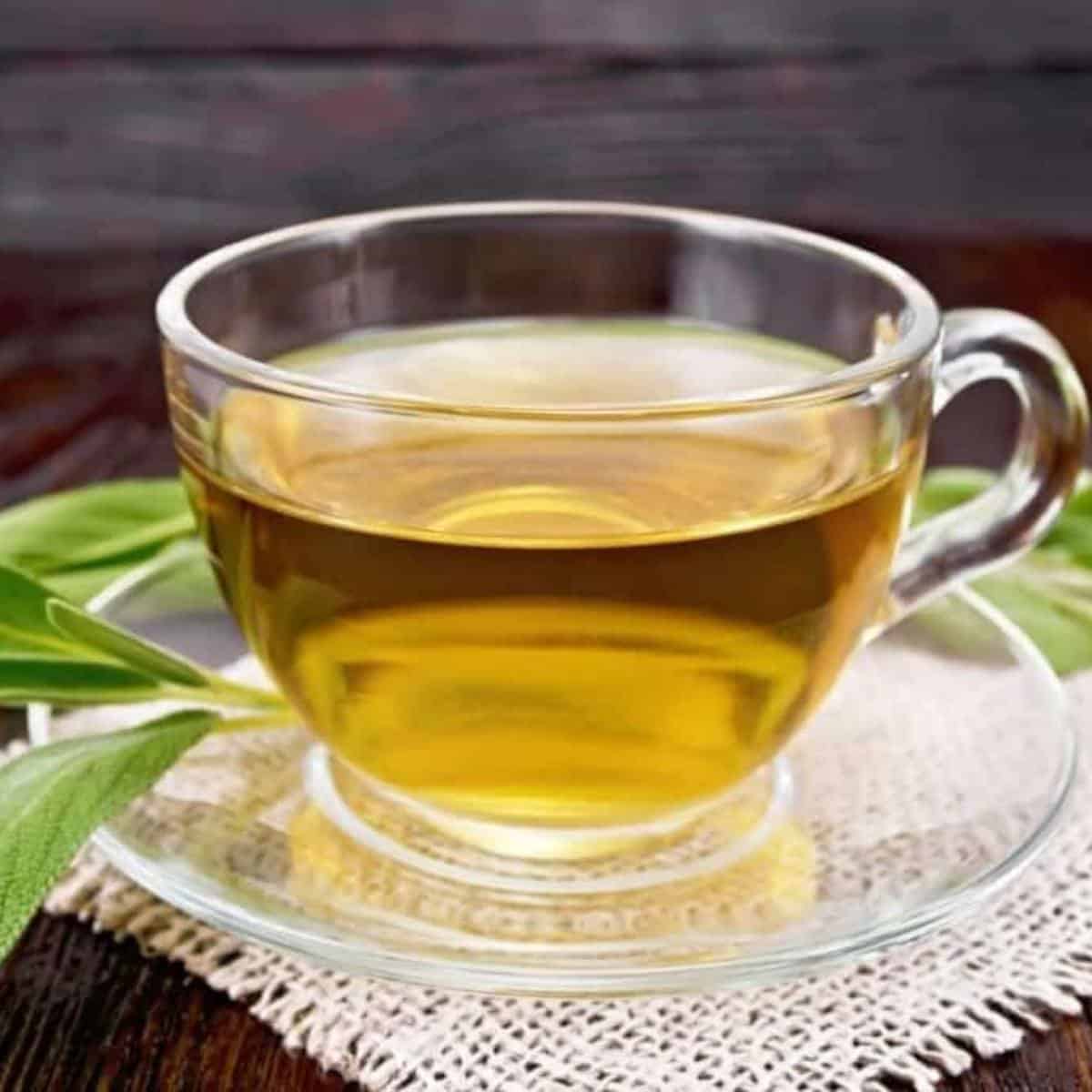
When you start intermittent fasting, you may find that your stomach requires some time to get used to this new schedule as hunger pangs set in.
Your focus can drift to thinking about your next meal and your blood sugar levels may seem unstable. The temptation to eat can become overwhelming.
A cup of tea has been known to help your body in certain times of need. In ancient times, tea was known as a health elixir by several cultures, and that thinking remains so now.
Certainly, drinking tea may make your fasting easier and help you stick to your schedule.
By helping prevent your hunger, bringing a sense of calm, and supporting your digestive health you can learn how to fast successfully with some soothing tea.
This site is for Informational Purposes Only. Always seek medical advice from your Primary Doctor.
Best Teas For Fasting
Best Green Tea: Bigelow Green Tea Bags
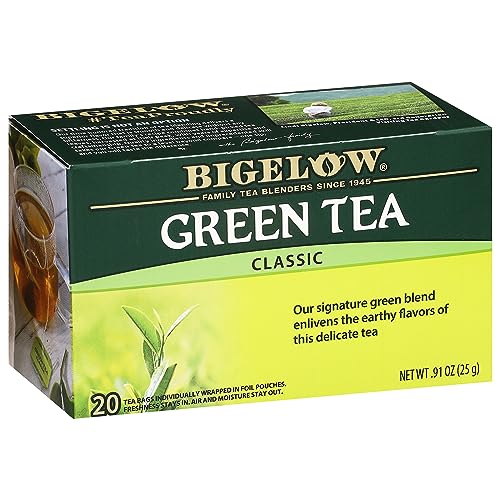
Likely the best tea for fasting is green tea as it is so well-known for soothing hunger pangs.
Fasting should not be painful and Bigelow’s Green Tea Bags are known to reduce the discomfort that can be felt while going without calories. That counts across their entire range and there are various flavors to sample.
Whichever you decide on, it will be packed with antioxidants for a healthy beverage with loads of added benefits.
Perhaps try it cold too as this is an ideal tea to steep for hours in some cold water to preserve even more antioxidants which we liked in our testing.
Pros:
- Antioxidants – The catechins in green tea are excellent antioxidants to improve your cellular health and immune system
- Enjoy Hot Or Cold – Green tea such as Bigelow’s can be drunk hot or left to steep for a few hours in cold water
- Range of Flavors – Try their Classic variety or with added Elderberry, Ginger, Lemon, Mango, Mint, and Pomegranate
Cons:
- Too Delicate Flavor – Flavors such as Mint and Peach seem to be lacking
Best Turmeric Ginger Tea: Vahdam Turmeric + Ginger Herbal Tea
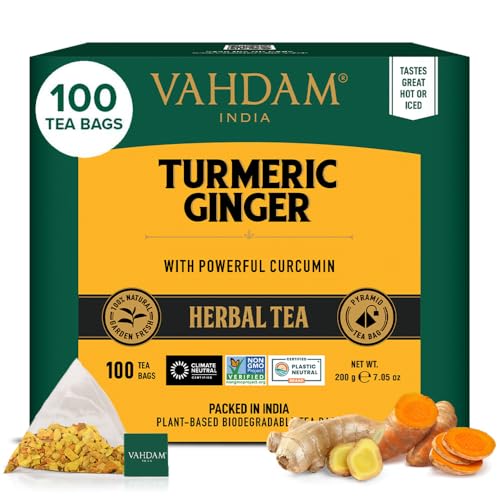
For tea to consume while fasting, you want one you can trust. With an ethical supply chain model and no caffeine, Vahdam’s Turmeric + Ginger Herbal Tea should make you feel good.
If you are to find a detox tea then it should involve the Indian ‘magic root’ of turmeric, especially here amongst completely natural ingredients.
The inclusion of ginger is a crucial one in this tea as the root is known to soothe an upset stomach. That should prove ideal for fasting which we enjoyed in our experience of this product.
When you do eat, the ginger should help to increase your satiety to make you feel full for longer, staving away those hunger pangs.
Pros:
- Pyramid Tea Bags – The innovative shape actively encourages a fresher brew through better infusion
- No Caffeine – This herbal tea is ideal for those wanting to go without caffeine during their fasting periods
- Ethical Supply Chain Model – Farmers receive more for their tea leaves and 1% of Vahdam’s revenue goes to the education of the children of their tea growers
Cons:
- Lack of Potency – Some users have commented that they need more than one bag to create a strong enough brew
Best Rooibos Tea: Cederberg Tea Company Red Rooibos Tea
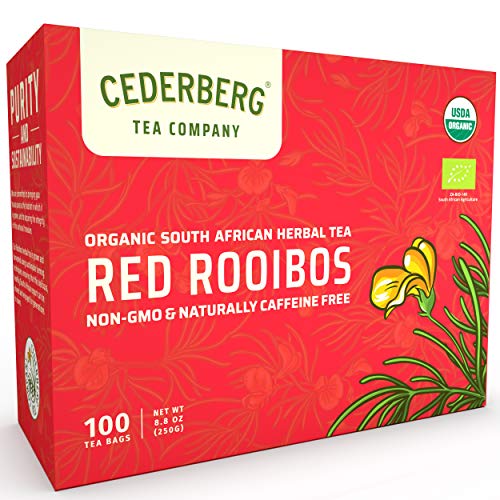
For a worthwhile dose of health-promoting antioxidants, try rooibos tea. This is another herbal tea that is great to drink during the evenings as it is naturally caffeine-free.
Several health benefits are well worth considering for fasting and weight management.
These include helping the body to metabolize fat effectively and even preventing the formation of fat cells in the first place.
Rooibos tea is also known to boost metabolism and the Cederberg Tea Company has gone even further with its production values.
From superheated steam sterilization to prevent the development of microbiology to laboratory testing to ensure that each batch meets control standards which we liked in our testing.
That each tea bag is biodegradable goes to show how well thought out their tea is, and it should work well for your fasting.
Pros:
- Super Heated Steam Sterilization – Ensures that each tea bag is free of microbiology
- Laboratory Testing – Bulk density and moisture levels are checked and approved by a national control board in South Africa
- Biodegradable Tea Bags – Each bag is made from compostable filter paper which has been heat-sealed and oxygen-whitened with no plastic involved
Cons:
- Cup Staining – There are reports that the tea has stained cups
Best Black Tea: Tea Forte Cherry Blossoms Organic Tea
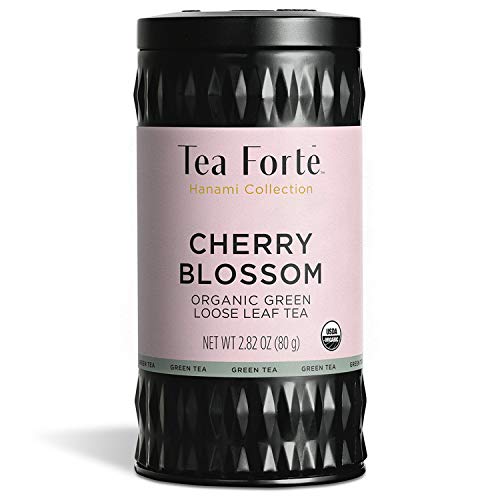
There is a clarification to make between black and green tea. They are both from the same plant though the difference is that black tea leaves are given time to oxidize.
This brings out their black hue and delivers a bold flavor, such as the one in Tea Forte Cherry Blossoms Organic Tea.
That blend of flowers, tea leaves, and tart cherry flavors is a rewarding sweet taste that negates the need for sugar.
The tea leaves themselves will also help your fasting with the inclusion of l-theanine which is an amino acid that can slow down the release of caffeine.
That might prove essential in the early morning when you require a brew to get you through the day which we liked in our testing.
Pros:
- Delicious Tea – A combination of flowers, organic green tea, and tart cherries gives this blend an irresistible taste
- Completely Recyclable Canisters – Do your bit for the environment with canisters that you can easily recycle
- L-theanine – The amino acid is known to slow the release of caffeine meaning you should feel the benefits of the energy boost and better focus for a longer
- Sweet Taste – No need for sugar as the blend has such a naturally sweet taste
Cons:
- Comparably Lacking Floral Scent – Some other herbal teas such as Jasmine can have a more flavorful scent
Best Peppermint Tea: Traditional Medicinals Organic Peppermint Herbal Leaf Tea
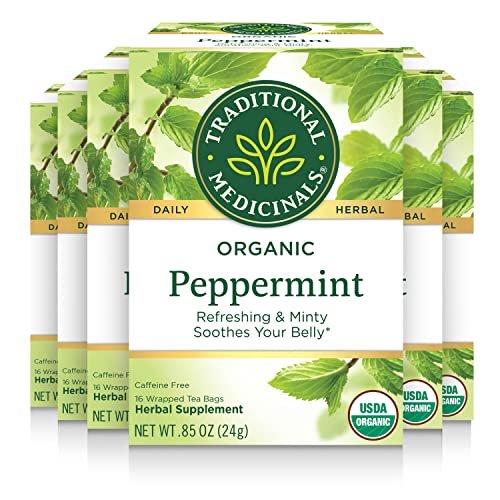
As peppermint has been known as a natural cure for stomach upset, you can be assured it can also help with digestive discomfort. That is ideal to combat those hunger pangs when you have gone 12 hours or more without calories.
The taste of Traditional Medicinals Organic Peppermint Herbal Leaf Tea is also deliciously refreshing which is great for a wake-up brew in the morning.
This is also a herbal tea that is plentiful in essential oils which means more of that minty taste. As the herbal tea is caffeine-free, you can also enjoy it before bed which we liked in our testing.
Pros:
- Organically Farmed Herbs – Enjoy a high level of essential oil due to the organic practices on their Western Washington farm
- Alleviates Digestive Discomfort – Great for combating hunger pangs while fasting and reducing bloating
- Fresh Taste – For a refreshing morning brew, peppermint works well to stimulate the senses
Cons:
- Bitter Taste – The minty taste is not for everyone and you may struggle to enjoy it without adding a sweetener
Buyers’ Guide
The best tea for fasting will help encourage weight management while fighting those hunger pangs that you may be dealing with.
Tea leaves have been used for centuries to help soothe certain conditions and boost the body’s cellular health.
With a steady dose of potent antioxidants, you can promote your immune system and your digestive health.
A cup of tea can still include caffeine yet when included with the amino acid, l-theanine, you can achieve a sense of focus without the crash you can expect from coffee.
There are further benefits from drinking tea which can also help your fasting.
The ginger root has been known to increase satiety so you feel less hungry. Green tea contains catechins which can help prevent a hormone imbalance known for causing hunger pangs.
Then there is hibiscus tea which can help calm the digestive system before you go to sleep.
For suitably encouraging results, it is widely recommended that you drink between three and four cups of tea a day.
You could also try cold-brewing your tea as hot water can burn off some antioxidants. Show some patience as you would have to leave the tea leaves to steep in cold water for between eight and twelve hours.
Calming Teas
For a calming cup of tea, you should look for a blend of l-theanine and caffeine. This synergistic combo is best found in black, white, and green teas.
The two substances work in tandem to promote a sense of calm. Indeed, l-theanine has been used by monks for centuries to help them through meditations and periods of fasting.
The amino acid is renowned for bringing about a sense of calm and focus.
If you are looking to increase your awareness then l-theanine can help and this is without the jolt then crash that a cup of strong coffee can bring.
That is largely why when you drink a cup of black, white, or green tea you can still feel focused yet without the hit that you get from coffee.
Prevent Hunger
Certainly, one of the most difficult phases of intermittent fasting to overcome is when the hunger pangs hit in the first couple of weeks.
This is your digestive system telling you that something has changed as it has become so used to being fed at certain times. In the mornings, you may find that missing out on an early breakfast signals those hunger pangs.
Drinking a cup of tea can help you stave off those pangs while still fasting. It has to be the right tea though with the right components and green tea is advised.
There is some science behind that as green tea contains catechins that support ghrelin levels.
You may not have heard of ghrelin but you have most likely felt it as this is the hormone that is largely responsible for those dreaded hunger pangs.
Once you go without calories, the ghrelin levels become unbalanced, and your desire to eat increases. The hormone can also be set off by stress which can be caused by pretty much anything without you needing to eat.
That want for a satisfying tub of ice cream after a hard week could even be caused by an imbalance in ghrelin levels. While it may not be as tempting, you could try a cup of green tea when you feel those hunger pangs come on.
Defeating hunger pangs is one way to ease your fasts yet feeling full can also help. For those moments when you have gone some hours without eating, you should try a cup of ginger tea.
The root is renowned for soothing an upset stomach yet can also promote satiety and that satisfied feeling that you get after a meal.
Hibiscus tea can also help in the late evenings after your final meal of the day when you need to stave off the temptation of snacking.
Drinking a cup of hibiscus tea can also help to promote a good night’s sleep and help you unwind before bed. The herb helps to relax the digestive system and has been known to help detox the liver.
Antioxidants/Detox
Not only are green tea catechins great for weight management and bearing those hunger pangs, but they are also potent antioxidants. You may be tempted to include a daily cup of green tea to aid your body’s cellular health and immune system too.
This can be especially important in the winter months when the cold sets in and you want to protect yourself from colds and flu.
Tea leaves are known to contain antioxidants known as polyphenols which can aid digestive health and combat free radicals in your body.
Not only that, they can promote brighter, healthier skin, sustained energy, and enhance your focus. The best teas for antioxidants tend to be rooibos, green tea, and hibiscus.
Frequently Asked Questions
Get your last-minute queries answered here!
What Is Intermittent Fasting?
Intermittent fasting is a lifestyle choice and a method of dieting that can have positive benefits for your health.
This could be from managing your weight and eating habits, boosting energy levels, and an improvement in your general health and wellbeing. Fasting is encouraged to ramp up your metabolism by going without calories for prolonged periods.
Such metabolic switching aims to use the energy from ketones which are stored in fat cells instead of the glucose from the liver.
This process of increasing ketones in the blood, known as ketogenesis, can help slow down aging, lead to stable blood sugar levels, and help reduce chronic inflammation.
The logic behind it is quite simple, you decide on your time for eating and non-eating. This could be separated into days or based on the hours of the day. For instance, you could decide to be eating one and not the next.
The 5:2 method is simply that you can eat like you usually would for five days a week but the other two days are considered fasting days when you can only eat between 500 and 600 calories each day.
Alternate-day fasting also involves consuming around 500 calories though this is every other day when you can eat normally on the alternate days.
If you choose to fast for 24 hours once, or maybe twice, a week while eating normally for the other days you would be following ‘Eat Stop Eat’.
Then there is ‘The Warrior Diet’ where you cram all your calorie consumption into a single four-hour window each day.
There is also time-restricted eating which is arguably easier to follow. Typically, the most popular schedule is to eat for just eight hours a day and fast for the remaining sixteen hours known as the 16/8 method.
This includes while you are sleeping which is why many find it simpler to eat between midday and 8 pm.
Why Are You Allowed To Drink Tea While Intermittent Fasting?
Tea is one of few substances that you are allowed to consume while fasting and it can even boost your hopes of losing weight. This is due to its appetite-suppressing qualities which will actively help you resist the urge to feast.
However, there are a few rules to follow to ensure you are not inadvertently ending your fasting period early. Your cup of tea has to be unsweetened and should be drunk plain. That means no milk and no sugar can be added.
The tea itself cannot include artificial flavorings or sweeteners. Check the label and pay attention to the nutritional facts to ensure that ingredients such as honey, milk powder, and sugar are not included.
If in any doubt, go for the most natural option. Loose tea should be additive-free and would be a safe choice.
What Benefits Does Drinking Tea Have Aside From Suppressing Appetites?
Drinking a cup of tea should become a regular habit once you learn of the fantastic health benefits that simple practice can bring.
Not only can it suppress appetites but also improves your skin condition, boosts your energy levels without involving caffeine, and boosts your immune system with antioxidants.
Your digestive system will also benefit as tea can help reduce inflammation internally and regulate your blood sugar levels.



